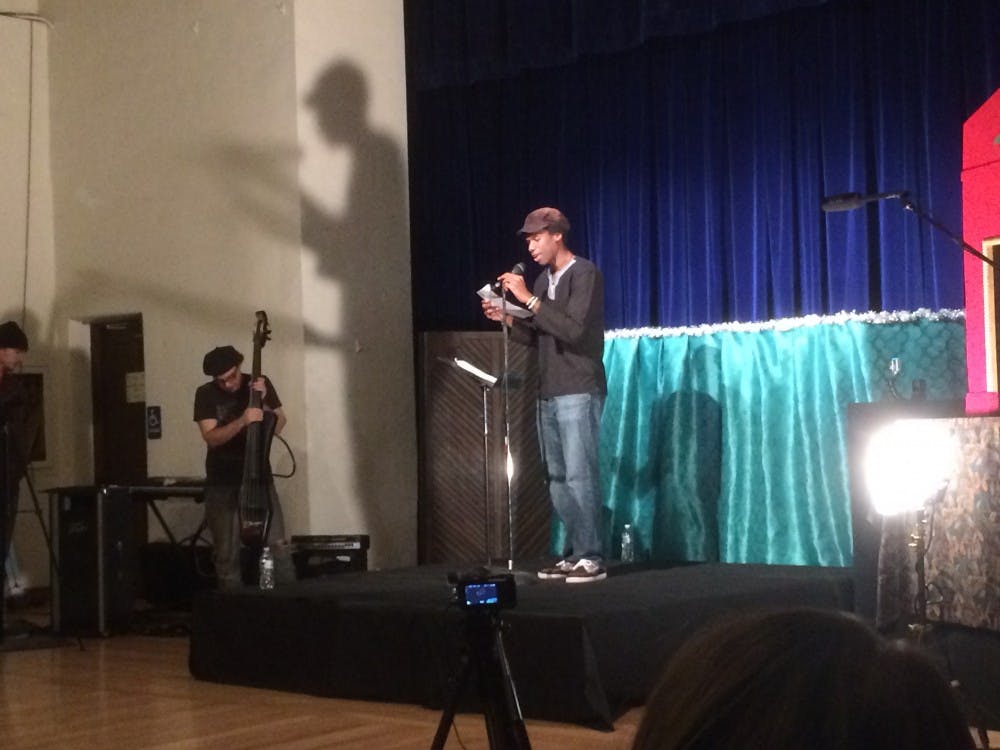The Great Arizona Puppet Theatre diverged from its usual programming on Friday to host the Rise Poetry Event, which showcased a group of poets discussing issues including PTSD, Black Lives Matter, sexual orientation and intersectionality.
The event was put on by a collaboration of various artists, but many would agree that Joe Montano III was the inspiration behind the event.
Montano is a poet and artist who is self-publishing his first book of poetry. He helps run the collective Balboa Poet House, which aims to produce quality work and hosts workshops.
The night started out low key, with a DJ spinning a jazzy version of The Door's "Light My Fire" while performing poet, Joel Joelskii Salcido danced in front of the stage.
Just a few minutes behind schedule, Deborah Berman-Montano took the stage and introduced herself as the hostess of the evening. She was later joined by Ernesto Moncada, a Mexican-born, downtown Phoenix resident and author. Montano would usually introduce the performing acts in English,t hen pass the microphone to Moncada who introduced them in a quickly-translated and enthusiastic Spanish.
The performers for the night were mostly poets, with the exception of a single dancer. But the event was not monotonous and each poet preformed in a different style, range and tone than the last.
ASU English instructor Bojan Louis was the first act. His poetry reflected a controlled but powerful voice. He read among other poems, a triptych of Petrarchan Sonnets, which he referred to as a high-brow. I'm still wondering if anyone else in the crowd knew what it was.
Afterwards was Yovani Flores, who read a single long poem about growing up in Chicago and later relocating to Arizona. Her style was a middle-ground between academic and slam.
Next was Tamika Lamb. If Flores was the middle-ground between styles, Lamb definitely leaned more toward the slam side of poetry, giving impassioned readings. Her work reflected the social injustices that face blacks in America. One of her poems told about how her father was profiled by a police officer for driving a "drug-dealer" car. I don't remember the title, but the image of her father buffing out his face imprint from the hood of the car where he was forcefully apprehended still sticks in my mind.
JC Koffy also preformed several poems, but his "hippest" was the one with the accompaniment of a bassist. After him was Melissa Dunmore, who read poetry that engaged with topics like women's rights and cat-calling.
Raji Ganesan was the only dancer of the evening and performed a piece recounting the tale of the goddess she was named after.
Next was Joe Montano III; he was a self-described crazy poet and read a few pieces for the audience.
Archetypal West Valley poet Marco Piña followed. Wearing a black cap, black hoodie and oversized Dickey's shorts Pina was a self described representative of the "hood." His poetry was excellent, each one of his poems about the West Valley were real and rhythmic, including turns of phrase like, "avenues turn to jail bars."
Two more poets, Rashaad Thomas and Susanna Velarde Covarrubius, preformed before Joel Joelskii Salcido stepped onto the stage. Salcido even cut his set a little short because the readings had run longer than expected. He resembles Allen Ginsberg, both physically and poetically.
Salcido is someone to catch at a reading on a night you're itching for a poetic fix.
Correction: Due to a reporting error, a previous version of this story incorrectly identified the central themes of the event and context of the event. This story has been updated with the correct information. We regret the error.
Reach the reporter at lsaether@asu.edu or follow @looooogaaan on Twitter.
Like The State Press on Facebook and follow @statepress on Twitter.




